News
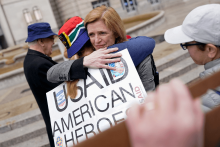
On Feb. 13, a federal judge ordered the Trump administration to unfreeze the billions of dollars in life-sustaining foreign aid suspended by executive order in January. The order, which cited “enormous harm” to global networks of relief agencies and the populations they serve, was met with relief by Christian anti-poverty and anti-hunger ministries. But even amid relief, the chaos of the last month has been relentless, say direct aid providers like World Vision and advocates like Bread for the World.
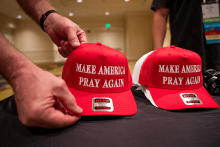
In late January, the Pew Research Center released a study of religious nationalism worldwide, including in the U.S. The results? Only 6% of Americans fit Pew’s definition of “Christian nationalist.” That's a smaller number that several previous estimates, but sociologists and researchers suggest it may just provide a shade of nuance to the way we think about religious nationalism in America.
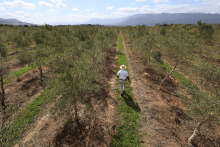
An executive order from the White House took aim at recent policies in South Africa designed to heal old wounds left over from apartheid. Now, a group of white South African religious leaders are pushing back on President Donald Trump's claims.
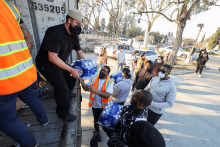
Pastor Ben Squires did not have “baseless allegations of money laundering by Lutheran social service agencies” on his 2025 bingo card.
And yet, in the early hours of Sunday morning, Feb. 2, Squires found himself reading a flurry of social media posts about Mike Flynn’s unfounded accusations and billionaire Elon Musk’s promise that the Department of Government Efficiency would be “rapidly shutting down” supposedly “illegal payments” to a list of Lutheran groups including Global Refuge (formerly Lutheran Immigration and Refugee Services), Pacific Lutheran University, and Lutheran Social Services organizations in Florida, Wisconsin, and South Dakota.
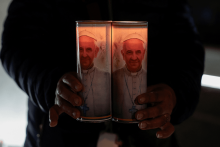
Pope Francis has shown the onset of double pneumonia, further complicating treatment for the 88-year pontiff, the Vatican said on Tuesday.
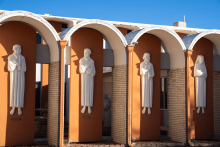
Across the U.S., 40 dioceses and religious orders have declared bankruptcy. The first was the Archdiocese of Portland, Oregon, in 2004. The most recent was the Diocese of Burlington, Vermont, in late September 2024. The cases vary, but they have one thing in common: The day the diocese filed its petition for bankruptcy is a new benchmark — no one is allowed to file claims against the church for abuses that happened before that date, even if a given state retroactively extends the statute of limitations.

More than two dozen Christian and Jewish groups are suing the Department of Homeland Security over President Donald Trump’s decision to allow law enforcement raids and arrests in churches and other sensitive locations.

Our team has spent a lot of time watching our activity on X, especially following Elon Musk's series of dramatic renovations. Now, our audience engagement manager explains why we've decided to move on to other platforms.
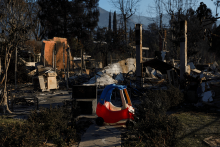
When Shimica Gaskins first saw the single-story green ranch style house in Altadena, Calif., she wasn’t in love with the color. But she was in love with Altadena, a community where the Black middle class was not only thriving but creating the kind of social fabric where she and her husband dreamed of raising their two kids. Eight years later, the citrus trees, native plants, and family memories had made the little green house a home. And then it burned down.

Now that President Donald Trump has rescinded longstanding policy limiting U.S. immigration enforcement in churches and other sensitive locations, some church leaders are wondering what they should do if an Immigration and Customs Enforcement officer comes knocking.
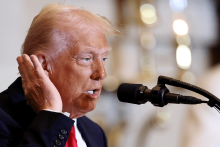
President Donald Trump said on Thursday he would create a White House faith office and direct Attorney General Pam Bondi to lead a task force on eradicating what he called anti-Christian bias within the federal government.
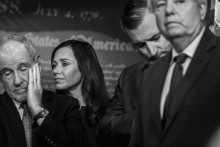
While policies and culture associated with the Christian Right often value men’s leadership and patriarchal structures, it’s a misconception that men entirely run the movement. From the beginning, women have been influential leaders in right-wing Christian movements.
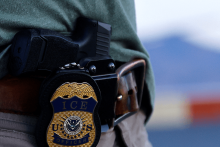
Within hours of coming into office, President Donald Trump rescinded a 14-year policy prohibiting Immigration and Customs Enforcement officers from arresting migrants near “sensitive locations,” including schools, hospitals, and places of worship. Here’s how church leaders responded

“It was chaos,” sighed Stacey Hall Burge, CEO of Found House Interfaith Housing Network, which provides emergency shelter and programs for families dealing with housing loss and insecurity in the Cincinnati area.
“From Monday to Friday, we had no specifics, no clarity,” said Burge, recounting the past week at her organization. “There are rents and supports for hundreds of families I am not sure how to pay right now. Families that worked hard to get off the streets, who may go right back. Many of them working, but unable to fully afford rent in the current housing crisis,” she told Sojourners in an interview over Zoom.
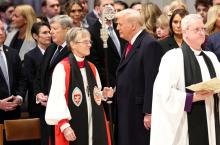
But before her sermon concluded, Budde addressed the president directly:
“Let me make one final plea, Mr. President: Millions have put their trust in you, and as you told the nation yesterday, you have felt the providential hand of a loving God. In the name of our God, I ask you to have mercy upon the people in our country who are scared now. There are gay, lesbian, and transgender children in Democratic, Republican, and independent families, some who fear for their lives.
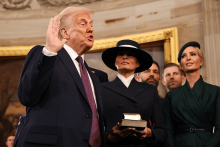
President Donald Trump’s inauguration as the 47th president was filled with religious imagery that often projected God’s blessing on Trump’s promises of American domination, expansion, and nationalism.
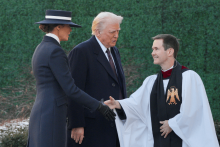
Rev. Robert W. Fisher, the rector of the church, told Sojourners in an email before the service that the church was making a concerted effort to return the service to its traditional roots. “The service is meant to be centered on God and humility before the almighty, and to be a call to ‘the better angels of our nature’ for those who are entering into a new season of service,” Fisher wrote in an email.
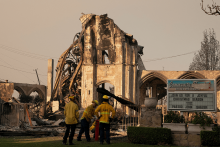
As images from the cataclysmic firestorms engulfing Los Angeles County emerged, one word came up consistently in the captions: apocalyptic. The devastating effects of unusually wet winters followed by record-dry foliage and the incendiary whip of Santa Ana winds created the conditions for what Sammy Roth, the Los Angeles Times’ climate columnist, called “apocalyptic infernos.” But for faith and justice leaders in LA, the fires were apocalyptic in another way.
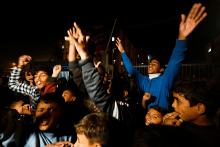
Israel and Hamas agreed to a deal to halt fighting in Gaza and exchange Israeli hostages for Palestinian prisoners, an official briefed on the deal told Reuters on Wednesday, opening the way to a possible end to a 15-month war that has upended the Middle East.
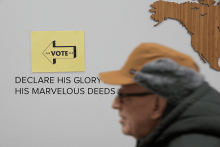
As countless Christians have expressed their disappointment with the results of the presidential election, many have heard in response platitudes such as “God is still on the throne” or “God is not Republican or Democrat.” Zach Lambert has heard those messages before. But as lead pastor of Restore Austin, he and his Texas team took a different approach. Instead of trying to “turn eyes heavenward,” his team worked to remind their church that God was with them in their grief and struggle.